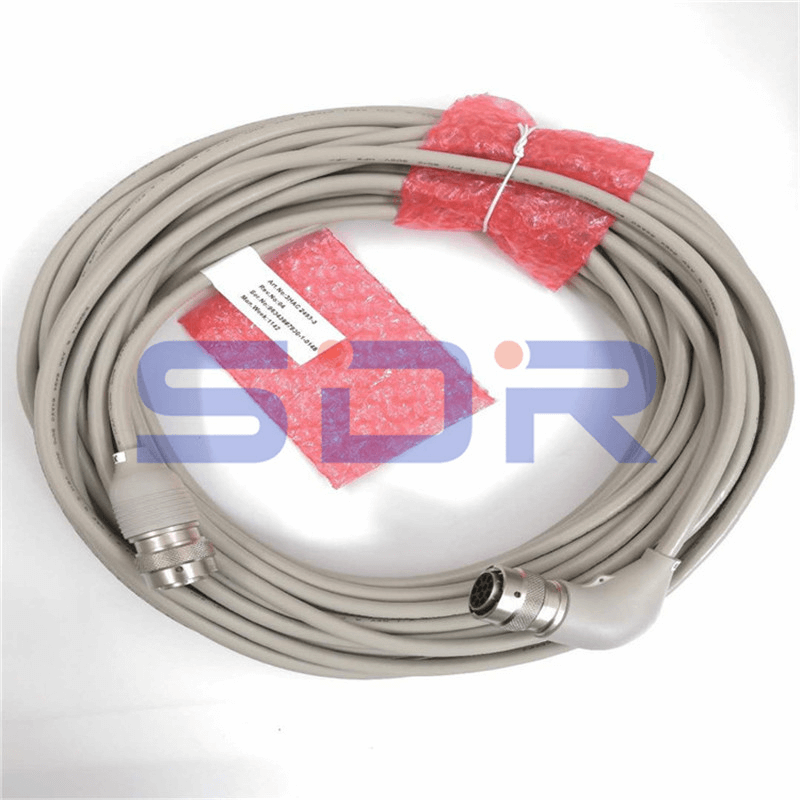ABB Encoder Cables are specially engineered to endure the rigorous demands of industrial environments where exposure to harsh elements is common. These cables are critical components in ABB's robotic systems, ensuring precise transmission of position data from encoders to control systems. Below, we explore the key features that allow ABB Encoder cables to perform reliably in challenging settings and the standards they meet to ensure high-quality performance.

In industrial environments, ABB Encoder Cables are often exposed to elevated temperatures due to heavy machinery, proximity to heat sources, or outdoor operations. These cables are constructed with insulation materials capable of withstanding extreme temperatures without degrading, such as specialized Thermoplastic Elastomers (TPE) or cross-linked Polyethylene (XLPE).
High-temperature resistance ensures that the signal integrity remains intact even in hot conditions, minimizing risks of thermal damage or signal interference.
Moisture is a common challenge in many industrial settings, from manufacturing plants to outdoor robotic applications. ABB encoder cables are designed to resist humidity, condensation, and even direct water exposure.
Many models meet IP67 or higher standards, which signify that the cables are protected against dust infiltration and can withstand immersion in water up to a certain depth for a specified duration. This protection is crucial for ensuring consistent signal transmission in wet or damp environments.
ABB encoder cables are frequently used in environments where exposure to chemicals, oils, and corrosive substances is a concern, such as chemical processing plants or automotive manufacturing facilities. The outer jackets of these cables are typically made from durable materials like Polyurethane (PUR), which provide excellent chemical resistance.
This chemical resistance prevents the degradation of the cable’s exterior, ensuring that it can withstand splashes or spills without compromising the functionality of the internal conductors.
Industrial robotics require cables that can handle physical stress, including bending, twisting, and abrasion. ABB encoder cables are designed with high flexibility, allowing them to endure repeated movements without wearing out.
The cables are constructed to handle millions of flex cycles, making them suitable for dynamic applications where continuous motion is required. Materials like Polyvinyl Chloride (PVC) or advanced composites are used to ensure durability under mechanical strain.
For outdoor applications, ABB encoder cables are often exposed to UV radiation and fluctuating weather conditions. UV-resistant jackets protect the cable from sun damage, preventing cracking or brittleness over time. Additionally, weather-resistant properties ensure reliable performance across a wide temperature range, from freezing conditions to hot climates.
ABB encoder cables meet various industry standards that confirm their environmental resilience:
IP Ratings (Ingress Protection): Many ABB cables are rated at IP65, IP66, or IP67, which define their resistance to dust, solid particles, and water ingress.
UL and CE Certifications: ABB cables often comply with UL (Underwriters Laboratories) and CE (Conformité Européenne) certifications, which validate their safety and reliability in different regions.
RoHS Compliance: ABB encoder cables are usually RoHS (Restriction of Hazardous Substances) compliant, meaning they avoid using materials that are hazardous to health or the environment.
ABB encoder cables are purposefully crafted to excel in challenging environments, providing reliable signal transmission even when exposed to heat, moisture, chemicals, physical stress, and UV radiation. Their compliance with stringent industry standards underscores ABB's commitment to quality and reliability in automation and robotics. With these features, ABB encoder cables ensure that robotic systems continue to perform with precision and efficiency, regardless of external conditions.